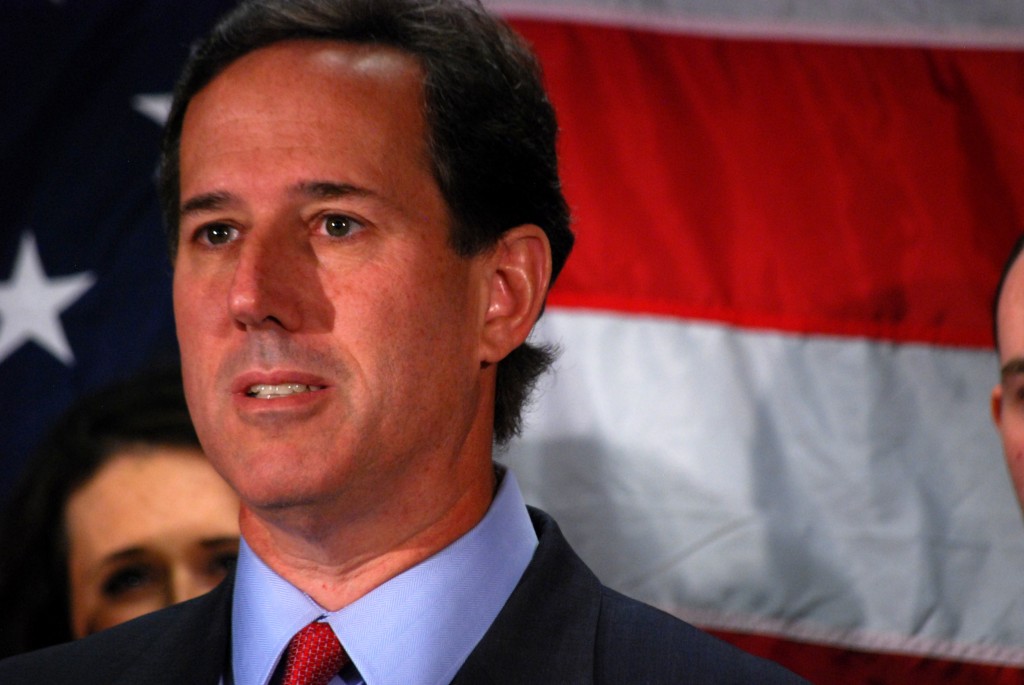
(CNN – San Diego LGBT Weekly) — Evangelical activist Michael Farris was not exactly surprised that Rick Santorum suspended his campaign on Tuesday. But that doesn’t mean that Farris, a longtime political organizer, knows what he’s supposed to do now.
“Right now my choice is to sit on my hands and do nothing or to actively try to find some alternative” to Mitt Romney, Farris said in an interview shortly after Santorum’s announcement.
“Some of us just have a hard time supporting a person who said he was going to be more liberal on gay rights than Ted Kennedy,” said Farris, chairman of the Home School Legal Defense Association, referring to remarks Romney made in a 1994 letter.
Farris’ reaction is a stark emblem of the disappointment among religious conservatives over Santorum’s announcement, and a reminder that Romney’s enthusiasm deficit among the conservative evangelicals who form the GOP’s base hasn’t gone away.
“There are two kinds of disappointment today,” said John Green, a religion and politics expert at the University of Akron. “One is felt by people who care a great deal about social issues, especially white evangelicals, who are uncomfortable with Mitt Romney.”
“And there’s another group who really liked Santorum,” Green continued, “and were quite excited about him not only because of the social issues but because they saw him as representing this positive role for faith and values in a society.”
The conservative and largely evangelical Family Research Council said in an email to supporters Tuesday night that Santorum’s announcement “was clearly disappointing news for those looking for a nominee who understands and articulates the connection between the social and fiscal challenges facing America.”
“His historical run for President achieved remarkable success because his campaign was based not on money spent, but on the pro-life, pro-marriage, pro-freedom message he carried,” the Family Research Council email blast said.
Religious conservatives were the key to Santorum’s unlikely rise as a serious presidential candidate. Conservative evangelicals and Catholics were drawn to Santorum as much for his personal story — he is a conservative Catholic and homeschooling dad of seven — as for his outspoken advocacy against abortion rights and same-sex marriage as a U.S. senator.
While polls showed him at the back of a seven-person pack just weeks before January’s first-in-the-nation Iowa caucuses, Santorum won a plurality of Iowa evangelicals, who accounted for nearly 60% of the electorate. That support laid the foundation for a first place Iowa finish.
After Santorum’s primary loss in New Hampshire to Mitt Romney – and days before Santorum would lose to Newt Gingrich in South Carolina – conservative religious activists convened in Texas and congealed behind the former Pennsylvania senator.
With strong evangelical support, Santorum went on to win primaries and caucuses in 11 states, even as Romney racked up more than twice as many delegates.
Not all conservative religious activists are as dead-set against Romney as Farris, who is also chancellor at Patrick Henry College, a school for homeschooled youth.
“Barack Obama will unite conservatives and people of faith more so than any single Republican candidate can hope to do,” said Mat Staver, an evangelical Christian who leads the conservative legal group Liberty Counsel.
But Staver said Romney would have to work hard to excite social conservatives.
“He’s going to have to make some intentional steps to reach out to evangelicals and religious conservatives,” said Staver. “It would be a mistake to assume he has every vote from evangelicals and religious conservatives locked up.”
At the moment, plenty of other conservative activists say they’re still in wait-and-see mode about the primary season.
“It’s very likely that he’ll end up the nominee, but he’s not he nominee yet,” said Steve Scheffler, president or the Iowa Faith and Freedom Coalition, about Romney. “He was never my first choice, but I’ll support him because the alternative is something we can’t live with.
“But I’m not ready to throw my support to him yet,” Scheffler said.












If Conservative Christians would do their own research, instead of accepting the biased views of their preachers, they would realize Mormons’ theology is based on New Testament Christianity, not the preachers’ Fourth Century Creeds. For example, the Church of Jesus Christ (LDS) views on Baptism, Lay Ministry, the Trinity, Theosis, Grace vs. Works, the Divinity of Jesus Christ are closer to Early Christianity than any other denomination. And Mormons’ teenagers have been judged to “top the charts” in Christian Characteristics by a UNC-Chapel Hill study. Read about it here:
http://MormonsAreChristian.blogspot.com/
According to a 2012 Pew Forum poll of members of the Church of Jesus Christ (LDS) 98 percent said they believe in the Resurrection of Jesus Christ, and 97 percent say their church is a Christian religion. Mormons have a better understanding of Christianity than any other denomination, according to a 2010 Pew Forum poll:
http://www.pewforum.org/Other-Beliefs-and-Practices/U-S-Religious-Knowledge-Survey.aspx
11 of the signers of the Declaration of Independence (including several presidents) were non-Trinitarian Christians. Those who now insist on their narrow Trinitarian and salvation-only- by-grace definition of Christianity for candidates for public office are doing our Republic an injustice.